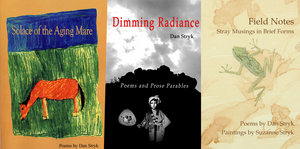

Rita Quillen: "Through Stryk's vigorous and unconventional mind, we see the world anew."
A recently retired professor of World Literature and Creative Writing at Virginia Intermont College in Bristol, Stryk was born in London and lived there for a time, as well as in the Midwest farm belt, before settling here. He has traveled extensively all over the world. Yet from reading his poems, I imagine he would say, like Henry David Thoreau, that he had "traveled widely" here in Bristol and its surrounding mountains as well.
Through Stryk's vigorous and unconventional mind, we see the world anew, Ralph Waldo Emerson's famous call for the "seer and namer" answered. Like the Chinese poets Li Po and Wang Wei whom Stryk so admires and invokes in all three of his books, Stryk is focused on the natural world.
Enlivened by his wife's up-close studies of nature's "lesser" creatures, such as squirrels, lizards and frogs (lesser, that is, to those artists of the world who prefer "big and beautiful" nature -- horse, lion, bear, eagle, horned stag), Stryk's Field Notes offers little gems like "Hearing Wild Geese": "A line of them now visible through sunset's/scarlet haze -- curved frets on a zheng / harp. Their calls sad as the twang of Southern / strings. Had I wings to sail away with them / beyond these sheer red peaks, I'd not return." Who among us has not, at least once, had our eyes drawn upward by the sight of a flying "V" above, heard the honking, and temporarily stopped what we were doing to wonder?
Notice that Stryk feels no need to teach or preach us anything about that moment, merely be, and let us be there with him. As venerated scholar Professor Wai-Lim Yip has noted, there's a sparseness and a heavy reliance on the imagistic in Chinese poetry and in all poets who have sought to emulate that great style, from Ezra Pound to William Carlos Williams to Dan Stryk. Yip writes: "Underlying the classical Chinese aesthetic is the primary idea of noninterference with Nature's flow." Stryk's poems are not overcooked; he doesn't insist on much "treatment" of his subject.
Two poems offer a sampling of this simple yet powerful aesthetic of image and sound. First, his title poem "Solace of the Aging Mare":
What luck on my first woodland
stroll in late March thaw
toward the nearby meadow
of grazing nags, when -- suddenly
at the wood's end, her brilliant
bay & keen black points
pierce the soft green down of
an Illinois spring so vividly
that grief of a long winter's
span, house-bound, falls off
like drab forgotten sluff,
the heart beats hard & firm,
& the vividness, on my walk back,
like a gasp in the humming
air, persists.
As in the epigraph at the beginning of "Waterbird in Winter" where Stryk quotes a T'ang axiom: "Look as, not at, the heron to arouse the river's spirit," the reader of Stryk's poems is to look through them, on to where the spiritual and the intellectual and the natural world all converge, to really see in the fullest sense of the word, a new world. The poem begins:
Silver light awakes me
as I step
between grooved stones
I've learned
to read like wrinkles
on my horny
palm, before the daystar
spurs, again
the first chill wind
through dangling
twigs that sway & rattle
softly
like the grizzled wisdom
of a sage's
locks...
This new postmodernist pastoral poetry of writers like Stryk, as well as many other writers from this region (Jeff Daniel Marion and Robert Morgan immediately come to mind) is a universe away from the Romantic pastoral of a Wordsworth, for example, but is still using nature in much the same way as those British and American Romantics of centuries past. Nature is a real mirror for both the poet and reader, but it's also a kind of "magic mirror" through which great spiritual epiphanies come and go, momentary redemptions recur, and the inquisitive, open heart, mind and soul find much to chew on.
If one sees clearly enough and has enough of a gift of language, poetry is stripped to its bare essence: a very good thing. As Ezra Pound told William Carlos Williams when urging the young poet to emulate the Chinese model and not the Western poets: "I think there must be more, predominately more, objects than statements and conclusions, which latter are purely optional, not essential, often superfluous and therefore bad."
Through his gift with words, Stryk creates a vividly visual poetry and pulls us out of the world we mostly ignore or destroy to see it again, more clearly, more aware of the endless daily miracles of life.
About Rita Quillen: She lives in Scott County, Va., and teaches English at Mountain Empire Community College in Big Stone Gap. Her collection of poetry, Her Secret Dream, was named the 2008 Poetry Book of the Year by the Appalachian Writer's Association. To read a review of Her Secret Dream and the article "Rita Quillen Recalls the Day She Discovered Appalachian Poetry. In addition to her books of poems, she is the author of a book of critical essays, Looking for Native Ground: Contemporary Appalachian Poetry, and an unpublished novel entitled Hiding Ezra. Her work has been included in several critically acclaimed anthologies, including Bloodroot: Reflections of Place by Appalachian Women Writers; Listen Here: Appalachian Women Writers; Appalachia Inside Out; and the Appalshop public radio series, Tell It On The Mountain.
THERE'S MORE:
- Rita Sims Quillen: 'What Probably Made Me A Writer'
BACK TO THE MAIN STORY:
- Back to Main story: Regional Poets Celebrate National Poetry Month